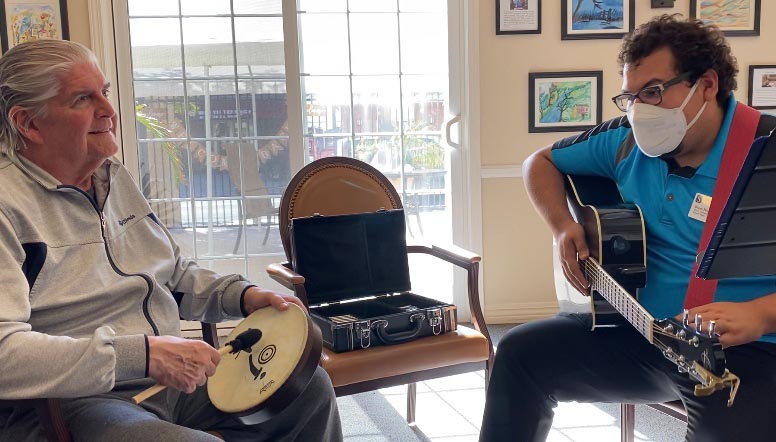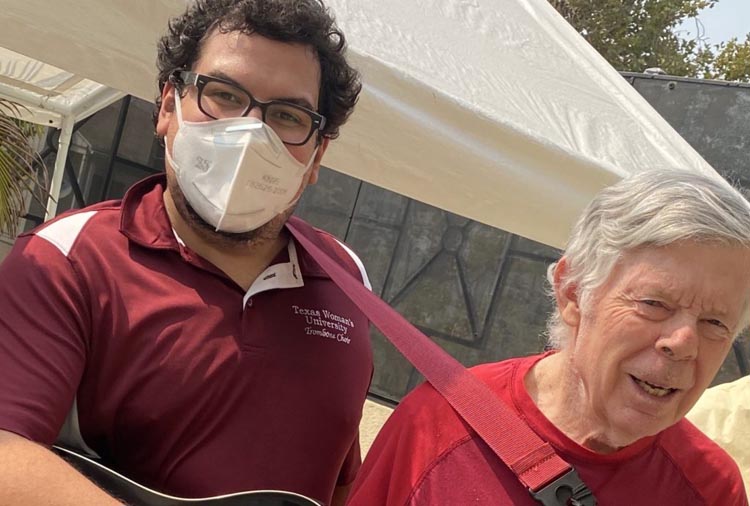

Beverly Place Music Intern
Read what a future care leader learned on the job
The unique Music Therapy Internship program at Silverado Beverly Place is designed to help prospective music therapists gain the skills and knowledge they need to use their music to change lives. Recently Brian, one of our interns, shared his experience working with residents in a paper for his school. We’re happy to share it here, and humbled by his words!
Brian’s story:
It is always an interesting conversation when I tell people that I am finishing an internship at a memory care facility. Usually, a person’s idea of memory care is a drab looking building with heavy locks, with residents either lying in bed or scattered around a main area. There may be some music in the background, or a television playing something that may or may not be relevant to what the residents may enjoy. They are clean, there are caretakers that will help the residents with activities of daily living (ie. bathing, eating, toileting.), and people are kept safe. Memory care facilities are not always seen as bad places, but somewhat dull and lacking life. They are seen as places where life is sustained until the resident’s passing. I too thought like this for the longest time. Through my volunteering at memory care facilities via Phi Mu Alpha Sinfonia Fraternity, and my practicum placement for my master’s degree, this was what I experienced. There was not abuse or a lack of care, but rather a very low idea of what a resident could do.
I noticed through my work in music that it had a profound effect on residents. Residents who were previously passed out and asleep were suddenly dancing in their seats and singing along to songs, getting all of the lyrics correct without any lyric sheet! They were socializing with each other, playing instruments, and discussing memories they had that were related to our music. However, I was only there for one hour a week, one day a week. I knew that when I left that building, residents would still be sitting there, just staring aimlessly at a television or doing a crossword. I just had to accept this reality, though, as every place I went to seemed to do things in the same way.
Silverado showed me how memory care was not simply just a group of people keeping residents alive, but that memory care is a place where people can have active and meaningful lives, no matter what stage of progression they are in. Residents can engage in meaningful and appropriate activities, and have accommodations that mirror that of their own personal lives. This is done through many means, but the one that sticks out to me the most is the emphasis on engagement and activities. In other placements, activities were seen as an extra treat, deviating from the norm. They were usually organized by a single Activities Director, that may have managed multiple sites at once, and usually were scattered events throughout the day. Instructions were given to caretakers on how to do an activity, and then they were left on their own. However, at Silverado, the entire day was packed with engaging and appropriate activities that were led by a team of trained engagement assistants, with caretakers assisting. These ranged from calmer activities, such as board games or learning about a famous person, to more active activities such as music and movement, and exercise. They are all advertised to residents as “clubs”, to give them a more official and exclusive feel. There would be a new activity every hour, starting from after breakfast and ending before dinner. Residents have the choice to attend these sessions, rather than being forced to attend. However, I have noticed that residents will often choose to attend, as they feel that their presence is important, and wanted.
Residents at Silverado are highly engaged in music. Music therapy is not just a one hour, once a week sing-along that is played to a select few residents, but a full part of the communities’ daily activities, on all floors. Sessions are led by either a board certified music therapist, or the music therapist’s hand-selected interns (who complete an internship as their last step before becoming board certified), and integrate a wide variety of styles and techniques in order to best serve residents. Residents can engage in instrument playing, singing, dancing, and meaningful reminiscence and discussions based around music, both in group and individual settings. Music serves not only as a way to have fun during the day, but also as a means to increase quality of life, and assist residents in reducing negative behaviors, while supporting other therapies they may be participating in. For instance, a resident may struggle to recall memories about their home, but upon hearing a song, can instantly and accurately talk about their home without any struggle. Music therapists work alongside all of the other therapies offered at Silverado, such as physical therapy, occupational therapy, speech therapy, and hospice, in order to promote the health of residents. Because of Silverado’s organization, where residents are placed on floors based on their progressions through the disorder, group sessions can more accurately be tailored to the abilities and interests of the group. For instance, with our Sensory groups, we focus on closer one-on-one care with a cappella music, and utilize oils and lotions to stimulate the residents’ senses. With the Loft, we can focus on more discussion-based groups such as DrumFit, a music therapy program based on utilizing communal drumming in order to promote wellness and health.
I have noticed that residents are also not as heavily medicated. Overmedication is often a problem that occurs at care facilities, as it is often the easiest thing to do to reduce negative behaviors. If a resident has difficult and repetitive behaviors, it can be difficult for the care team to manage, and medication solves the issue without much work. However, with Silverado’s emphasis on reducing unnecessary medication, our team of trained staff can manage these behaviors through other means. Residents will often develop anxiety and depression as their dementia progresses, which can be expressed in unusual and sometimes abrasive behavior. However, many of these can be reduced through other means. A common reason for anxiety and depression to develop is feelings of loneliness and hopelessness. However, by promoting social engagement, and creating activities meaningful to the resident, they can feel as if they belong, are wanted, and have purpose in their day to day lives. Feelings of anxiety and depression are not simply diverted and ignored, but rather addressed in group and individual sessions, matching whatever the resident may need in that moment.
Music therapists support the engagement team, the engagement team supports us, and the staff and community at Silverado all support each other in promoting the health of every resident in the community. It makes me happy to see that there is a place that has such an emphasis on providing a life-filled memory care experience. I can think of memory care as a place full of excitement, direction, and supportive staff all around. Residents are much happier and more active than at any placement I have been to before, and as a result, they are able to do so many things that I could not imagine. I do not attribute this success to a single isolated event or department of Silverado, but rather upon the structure of how the community is built and managed. Every single piece works together to create a meaningful experience. I feel that every department is there to support me, and I am there to support them in promoting the health of each resident. It is amazing to me to think that I am currently seeing a modified version of Silverado’s normal operations, due to the COVID-19 pandemic. If this is how active and lively the community is during a pandemic with reduced vendors and higher regulations, I cannot even begin to imagine how amazing the community is in normal times.
Being at Silverado makes me hope that this structure and emphasis on engaged living continues at other facilities, because being here has given me so much hope about what memory care can be. I no longer end my day thinking “I wish there was more I could do”, but rather “Let’s see what more we can do.”


